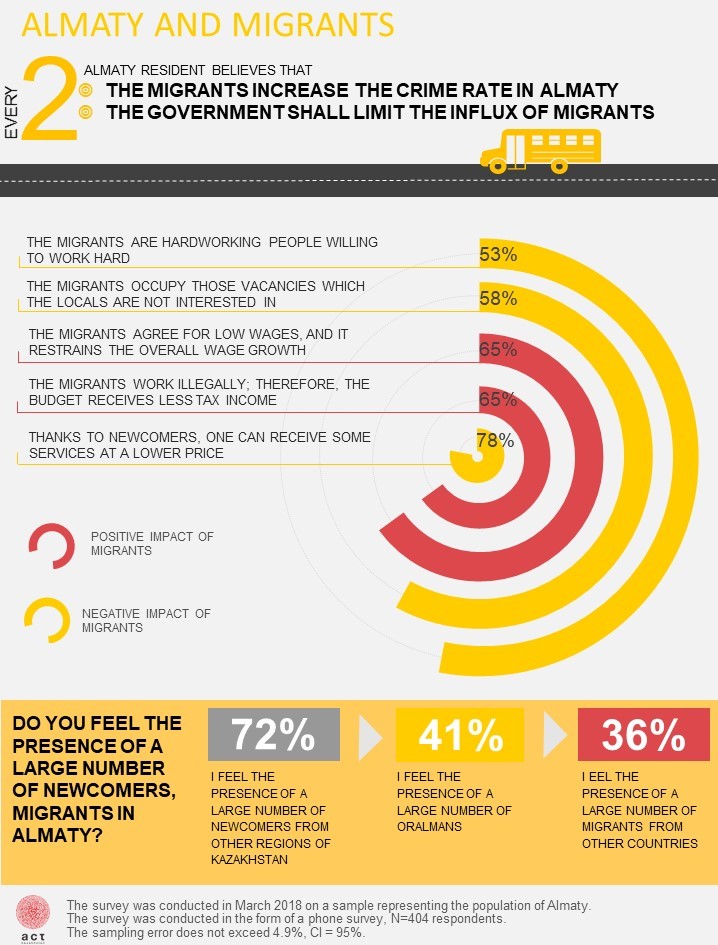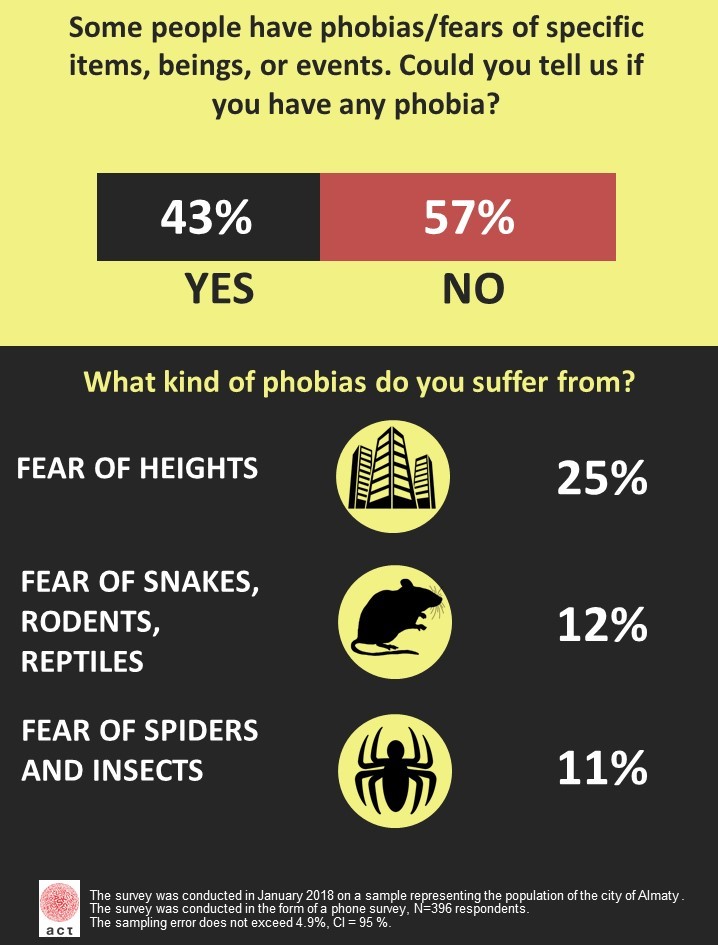




The world community is more and more concerned about environmental issues. They gather conferences, sign international agreements. Even schoolchildren do not stay away from this worldwide problem: they boycott classes, calling for attention to what is happening around. But to everyone’s regret, detailed information and data on the real scale of what is happening are limited. This information deprivation is characteristic of our country as well. In July 2019, ACT Kazakhstan conducted an environment survey among Almaty residents. The survey studied the involvement of residents in the problems and solutions to the environmental situation in the city.
42.3% of the respondents considered the environmental situation in Almaty as unfavorable. The others assessed it as follows:
According to the survey, the responding Almaty residents treat air pollution from automobile exhaust (79.4%) as the most pressing environmental problem.
According to the city residents surveyed, TOP5 environmental problems include:
It is worth noting a difference in male and female views on the problem. Both men and women consider air pollution from automobile exhaust to be the main problem. However, men put in second place the air pollution from industrial exhaust (16.1%) while women mentioned the household waste (19.1%). Being asked about the activities they take part in to protect the environment, 24% of the respondents said they were taking no action. Most of the respondents (55.5%) said they always scrape together the litter left after having a picnic. TOP2 answer was, “I take no action since I don’t know what to do” (18.3%).
TOP5 activities in which Almaty residents take part in to protect the environment:
The survey showed that women were more conscious about sorting and disposing of garbage. 7.5% of women in Almaty try to buy as fewer plastic items as possible vs. 5.7% of men; 4.3% of women by eco-products vs. 2.5% of men. However, men were more active in planting trees – 6.8% vs. 4.5% of women. During the survey, we asked the Almaty residents about their attitude to the use by some companies of recycled paper/cardboard for packaging.
In particular, we studied the attitude of the target audience to the statements:
The survey was conducted in July 2019 among the population of the city of Almaty on a sample representing the city population. The age and gender quotas corresponded to the data of the Statistical Committee MNE RK. The survey was conducted by the method of phone interviews. The sample included 402 respondents. The sampling error does not exceed 4.9%, CI = 95%. The use of survey materials is permitted with the obligatory mention of the author of the survey.

In this survey, ACT Kazakhstan has identified the perception and attitude towards migrants in Almaty. The survey showed that more than half of the respondents (53%) did not feel the presence of a large number of migrants from other countries. At the same time, every third Almaty resident (36%) said to the contrary. Taking into account the socio-demographic profile, mostly women aged 46 to 57 years felt the presence of a large number of migrants from other countries. According to the survey, the majority of respondents (72%) felt the presence of a large number of newcomers from other regions of Kazakhstan. Such perception was most common among men aged 46 to 57 years old. Regarding oralmans, the opinions divided equally: 41% of the respondents felt the presence of a large number of repatriated ethnic Kazakhs, while 40% did not feel the presence of a large number of newcomers of this category.
During the survey, the locals most often agreed with such positive statements regarding migrants as:

By gender and age groups, men aged 18 to 27 years mostly shared the positive statements. At the same time, some negative statements towards migrants were registered:
By gender and age groups, men prevailed in negative statements as well, but in this case, they were aged 46 to 65 years. Every second respondent believed that the Government should limit the influx of migrants. The survey was conducted in March 2018 among the population of the city of Almaty on a sample representing the city population. The survey was conducted in the form of a personal interview. The sample size was 404 respondents. The sampling error does not exceed 4.9%, CI = 95%. The use of survey materials is permitted with the obligatory mention of the author of the survey.
Companion animals have become an integral part of human life, and we do not think about their usefulness. ACT Kazakhstan tried to identify if many people kept dogs, cats, and other companion animals and what their benefit is for their holders. The survey showed that more than half of the respondents (56%) kept companion animals. Out of those, who kept companion animals, 64% preferred cats, 63% – dogs, 10% – birds. About 5% of the respondents kept exotic animals: turtles, lizards, snakes, snails, spiders, hedgehogs, guinea pigs.
The way the current holders obtained their pets:
– Bought – 47%
– Received as a present – 28%
– Picked up in the street – 25%
– Took from their friends/relatives/familiars – 10%
– Took from an animal shelter – 4%
Every fifth resident of Almaty who did not have a companion animal expressed a desire to have one within one year. During the survey, we asked about the influence of companion animals on people and the living conditions of companion animals.
We received the following answers to the proposed statements:
– 84% of the respondents believed that companion animals improved the emotional state of their holders
– 82% of the respondents believed that the presence of a companion animal at home helped fostering children (developing such features as kindness, responsibility, mercy)
– 71% of the respondents believed that companion animals had a positive impact on the health of their holders
– 68% noted that living in a flat did not allow them to hold companion animals since a private house would be a better place for them
– every second respondent (49%) considered it expensive to hold a pet
– 2/3 of the respondents agreed that there were many homeless animals on the streets of Almaty (43% – very many, 32% – rather many).
Most of the respondents (58%) did not care for homeless animals (34% responded they had a neutral attitude and did not participate in taking care for homeless animals, 24% were only feeling empathy). Among the Almaty residents who took care of homeless animals: 43% gave them food, 2% made charitable contributions for the rescue, treatment, and socialization of homeless animals, 2% helped to spread information (e.g., in social media) about taking care of homeless animals, 1% were volunteers taking care of homeless animals. The survey covered the issue of the need to control the population of homeless animals in the city – 1% of the respondents thought that their population needed no control.
The respondents who voted for control over the population of homeless animals proposed the following measures:
– To place them in shelters/nurseries – 49%
– To castrate them – 26%
– To catch them and release outside the city – 5%
– To euthanize them – 5%
— To conduct educational work among people – 2%
The survey was conducted in March 2018 among the population of the city of Almaty on a sample representing the city population. The survey was conducted in the form of a personal interview. The sample size was 404 respondents. The sampling error does not exceed 4.9%, CI = 95%. The use of survey materials is permitted with the obligatory mention of the author of the survey.
ACT Kazakhstan was investigating whether residents of Almaty have phobias/fears. Let us remind you that phobia is a current fear of imaginary events. The survey showed that 43% of the respondents had different phobias (fears); accordingly, 57% had no phobias. Women were found to be more tend to phobias (64%); the age group most tending to phobias was 25-35 years (34%).
The survey revealed a long list of phobias that haunted Almaty residents. Such a variety of phobias was mainly due to a small percentage of people suffering from this or that phobia. Such small shares of specific phobias characterize the very concept of phobia – this is something that terrifies a particular person while the others remain indifferent to it. In total, there about 1,000 known different phobias in the world. The study of phobias of Almaty residents showed that most of the people suffered from the fear of heights (acrophobia), which is a form of the fear of space. 12% experienced a fear of snakes, rodents, reptiles. 11% of the adult population of Almaty had a fear of spiders and insects (arachnophobia).
Below is the list of other phobias identified by the survey:

The survey was conducted in January 2018 among the population of the city of Almaty on a sample representing the city population. The survey was conducted in the form of a personal interview. The sample size was 396 respondents. The sampling error does not exceed 4.9%, CI = 95%. The use of survey materials is permitted with the obligatory mention of the author of the survey.